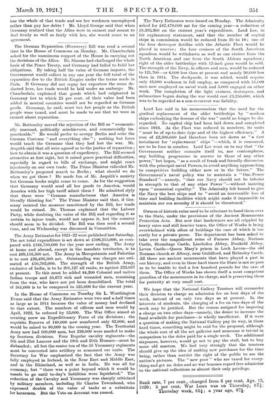Mr. Bottomley moved the rejection of the Bill as "
economic- ally unsound, politically mischievous, and commercially im- practicable." He would prefer to occupy Berlin and seize the German Customs " and everything else " ; nothing but force would teach the Germans that they had lost the war. Mr. Asquith said that all were agreed as to the justice of reparation ; how to obtain it was a question of expediency. The Bill seemed attractive at first sight, but it raised grave practical difficulties, especially in regard to bills of exchange, and might react injuriously on our own trade. The Prime Minister ridiculed Mr. Bottomley's proposed march to Berlin ; what should we do when we got there ? He made fun of Mr. Asquith's anxiety lest German books might cease to come. As for the suggestion that Germany would send all her goods to America, would America with her high tariff admit them ? He admitted slyly that there were " German manufactures that America is literally thirsting for." The Prime Minister said that, if Ger- many resisted the measure sanctioned by the Bill, her trade would be ruined. Mr. Thomas explained that the Labour Party, while doubting the value of the Bill and regarding it as certain to injure trade, would not oppose it, lest the country should seem to be divided. The Bill was then read a second time, and on Wednesday was discussed in Committee.


































 Previous page
Previous page